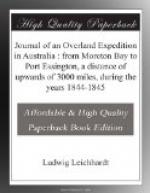August 19.—The river was joined by a running creek from south-south-west, which we had to follow up about five miles, where it formed a very narrow channel between thickets of palm trees, drooping tea-trees, Sarcocephalus, and particularly Pandanus, which crowded round the tiny stream. We again travelled north-west, over several plains, separated by belts of timber, and, at the end of about five miles, came to a fine brook, whose pure limpid waters flowed rapidly in its deep but rather narrow channel, over a bed of rich green long-leaved water plants. Magnificent tea-trees, Casuarinas, and Terminalias, gave a refreshing shade, and Pandanus and Corypha palms added to the beauty of the spot.
The plains were well-grassed, but full of melon-holes. I observed on them a few small trees, belonging to the Sapindaceae, with pinnate and rather drooping leaves, with a light grey bark, exuding a good eatable gum.
I called the brook “Beames’s Brook,” in acknowledgment of the liberal support I received from Walter Beames, Esq. of Sydney.
We again enjoyed here the young shoots of the Corypha palm.
August 20.—We crossed Beames’s brook without difficulty, and travelled about two miles north-west, over a plain, when we came to a river with a broad sandy bed and steep banks, overgrown with large drooping tea-trees. Its stream was five or six yards broad and very shallow. Parallel lines of deep lagoons covered with Nymphaeas and Villarsias were on its west side. The bergue between the river and the lagoons was covered with bloodwood and leguminous Ironbark; and fine box flats were beyond the lagoons.
I called this river the “Nicholson,” after Dr. William Alleyne Nicholson, of Bristol, whose generous friendship had not only enabled me to devote my time to the study of the natural sciences, but to come out to Australia. The longitude of the Nicholson was 138 degrees 55 minutes (approx.)
After passing the box flats along-the river, we entered into a country covered with thickets and scrub, rarely interrupted by small patches of open forest, and travelled about fourteen miles north-west from the river, when the setting sun compelled us to encamp, without having been able to find water. Just on entering the scrub, we saw four emus walking gravely through a thicket of the little Severn tree, picking its bitter fruit, and throwing occasionally a wondering but distrustful glance at our approaching train. Charley and Brown, accompanied by Spring, gave chase to them, and killed one, which was in most excellent condition. When we came to the camp, we secured the horses, and watched the bullocks, as was usual on such occasions, and fried and enjoyed our fresh meat as well as we could. To satisfy my companions I determined to reconnoitre the country in advance by moonlight; and allowed them to return to the lagoons of the Nicholson, should I not have returned by 10 o’clock next morning. Accordingly, I started with Charley when




